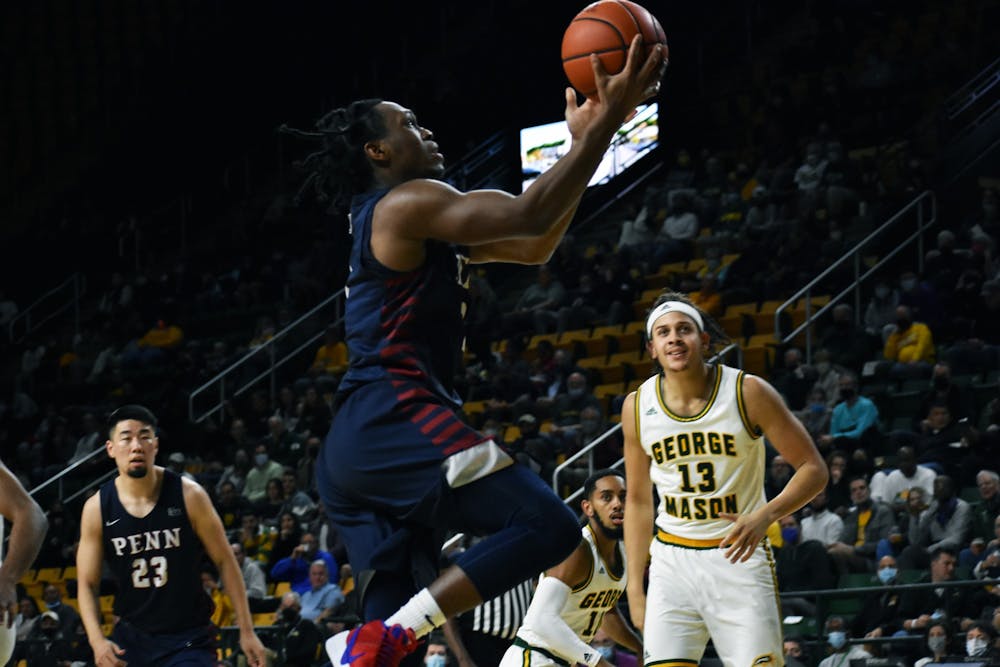
Sophomore Jordan Dingle shoots during the second half of the game against George Mason on Nov. 12.
Credit: Samantha TurnerOn Friday night, Penn wasn't able to notch its first win of the season, falling to George Mason 87-66. Thanks to a slow start in the first half and a bevy of three-pointers from the Patriots, George Mason never trailed in the game, and was able to maintain a sizable lead for most of the contest.
The loss drops the Quakers to 0-2 with 12 more games before Ivy competition begins. With tough matchups looming on the horizon, the Red and Blue will need to make some improvements if they want to be the first Ivy League team in the NCAA tournament since 2019. Here are some key takeaways from Friday's loss.
Shaking off a year of rust will be key against non-conference opponents
Penn's Nov. 10 loss to FSU was the Quakers' first competition in 613 days, and the team seemed noticeably disoriented throughout much of this game. Penn turned the ball over 16 times and especially struggled in the first half, hitting just 33% of field goals and four of 13 three-pointers. George Mason, on the other hand, came out white hot, shooting 56% with seven of 16 three-point shooting.
The Patriots are a solid basketball team, but they had one major advantage over the Quakers: They played basketball last year. George Mason finished a shortened 2020-2021 season with a 13-9 record, and all of its starters against Penn had previous collegiate experience. Josh Oduro had 34 career starts alone heading into the season. The Quakers, on the other hand, have eight players who have played college minutes: Michael Wang, Jordan Dingle, Max Martz, Max Lorca-Lloyd, Griffin Ryan, Bryce Washington, Alex Imegwu, and Lucas Monroe. Martz has been held out of both of the Quakers' contests so far, and aside from Jordan Dingle, the aforementioned players have played a combined 1,690 out of a possible 11,751 minutes from 2018 to 2020. Moreover, Bryce Washington has fallen out of favor in Donahue's rotation, and Michael Wang missed all of 2019-2020 with injury.
Replacing the production of Devon Goodman, AJ Brodeur, and Ryan Betley is not an easy task, but it all starts with developing solid team chemistry, which comes with more games. Penn might not be as successful against non-conference opponents as they have been in recent years, but it will serve them well to prepare for the real competition in January.
Paint scoring is important for the Quakers' success
Coach Steve Donahue emphasized at post-game that he'd like to see Penn converting more shots in the paint; against George Mason, the Red and Blue were outscored 36-18 in the paint. It didn't help that the team's starting center, Max Lorca-Lloyd, faced early foul trouble, limiting him to 15 minutes and forcing freshman center Nick Spinoso into action. Still, the Quakers attempted few shots around the rim, often settling for threes or mid-range shots, the latter of which Donahue notoriously campaigns against.
Before the season, Donahue indicated the Quakers could opt to roll with bigger lineups this season to replace the paint production of Penn's all-time leading scorer AJ Brodeur. With Martz still injured, Donahue rolled with two-way guard Lucas Monroe, giving the Red and Blue a smaller lineup. Still, Lorca-Lloyd and Spinoso have not produced much on offense for the Quakers, and this needs to change if Penn wants to be competitive come January.
Jordan Dingle is the real deal, but he needs to let the game come to him
The 2019-2020 Ivy League Rookie of the Year has strung together two 20-point outings to start the season, building on a strong freshman campaign and cementing himself as one of the Ancient Eight's rising stars. Dingle shot a respectable eight for 15 against FSU, but against George Mason, he missed 15 of 22 shots and made one of eight three-pointers. Dingle took 13 shots in the first eight minutes of regulation, and at post-game, Donahue indicated that Dingle was trying to do too much.
It makes sense that Dingle shoulders the scoring load for the Quakers given that he has by far the most scoring experience on the roster. Still, a lot of Dingle's early shots seemed forced, and good shot selection is key to success in the Ivy League.
The Daily Pennsylvanian is an independent, student-run newspaper. Please consider making a donation to support the coverage that shapes the University. Your generosity ensures a future of strong journalism at Penn.
Donate







